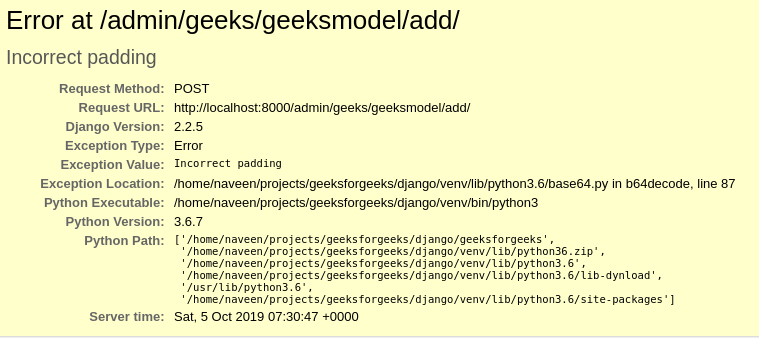BinaryField – Django Models
Last Updated :
05 Aug, 2021
BinaryField is a special field to store raw binary data. It can be assigned bytes, bytearray, or memoryview. By default, BinaryField sets editable to False, that is it can’t be included in a ModelForm. Since BinaryField stores raw data or in other terms a python object, it can not be manually entered and needs to be assigned through a view or django shell. This is what editable to False means, that is it can’t be edited through any form.
Syntax
field_name = models.BinaryField(**options)
Django Model BinaryField Explanation
Illustration of BinaryField using an Example. Consider a project named geeksforgeeks having an app named geeks.
Refer to the following articles to check how to create a project and an app in Django.
Enter the following code into models.py file of geeks app.
Python3
from django.db import models
from django.db.models import Model
class GeeksModel(Model):
geeks_field = models.BinaryField()
|
Add the geeks app to INSTALLED_APPS
Python3
INSTALLED_APPS = [
'django.contrib.admin',
'django.contrib.auth',
'django.contrib.contenttypes',
'django.contrib.sessions',
'django.contrib.messages',
'django.contrib.staticfiles',
'geeks',
]
|
Now when we run makemigrations command from the terminal,
Python manage.py makemigrations
A new folder named migrations would be created in geeks directory with a file named 0001_initial.py
Python3
from django.db import migrations, models
class Migration(migrations.Migration):
initial = True
dependencies = [
]
operations = [
migrations.CreateModel(
name ='GeeksModel',
fields =[
('id',
models.AutoField(auto_created = True,
primary_key = True,
serialize = False,
verbose_name ='ID'
)),
('geeks_field', models.BinaryField()),
],
),
]
|
Thus, an geeks_field BigIntegerField is created when you run makemigrations on the project.It is a field to store raw binary data.
How to use BinaryField ?
Any type of data can be converted into bytes including integers, strings, images, etc. Let’s try to save a string into the BinaryField. String can be converted to bytes using the generic bytes function. This function internally points to CPython Library which implicitly calls the encode function for converting the string to the specified encoding.
Python3
from geeks.models import GeeksModel
test_string = "GFG is best"
res = bytes(test_string, 'utf-8')
geek_object = GeeksModel.objects.create(geeks_field = res)
geek_object.save()
|
Now let’s check it in admin server. We have created an instance of GeeksModel

Possible errors
As specified, BinaryField is a non-editable field, if you manually try to make it editable using editable=True it will create unexpected errors. It should be created in a function so that objects can be allocated to it.

Field Options
Field Options are the arguments given to each field for applying some constraint or imparting a particular characteristic to a particular Field. For example, adding an argument null = True to BinaryField will enable it to store empty values for that table in relational database.
Here are the option and attributes that an BinaryField can use.
| Field Options |
Description |
| Null |
If True, Django will store empty values as NULL in the database. Default is False. |
| Blank |
If True, the field is allowed to be blank. Default is False. |
| db_column |
The name of the database column to use for this field. If this isn’t given, Django will use the field’s name.
|
| Default |
The default value for the field. This can be a value or a callable object. If callable it will be called every time a new object is created.
|
| help_text |
Extra “help” text to be displayed with the form widget. It’s useful for documentation even if your field isn’t used on a form.
|
| primary_key |
If True, this field is the primary key for the model. |
| editable |
If False, the field will not be displayed in the admin or any other ModelForm. They are also skipped during model validation. Default is True.
|
| error_messages |
The error_messages argument lets you override the default messages that the field will raise. Pass in a dictionary with keys matching the error messages you want to override.
|
| help_text |
Extra “help” text to be displayed with the form widget. It’s useful for documentation even if your field isn’t used on a form.
|
| verbose_name |
A human-readable name for the field. If the verbose name isn’t given, Django will automatically create it using the field’s attribute name, converting underscores to spaces.
|
| validators |
A list of validators to run for this field. See the validators documentation for more information.
|
| Unique |
If True, this field must be unique throughout the table.
|
Share your thoughts in the comments
Please Login to comment...